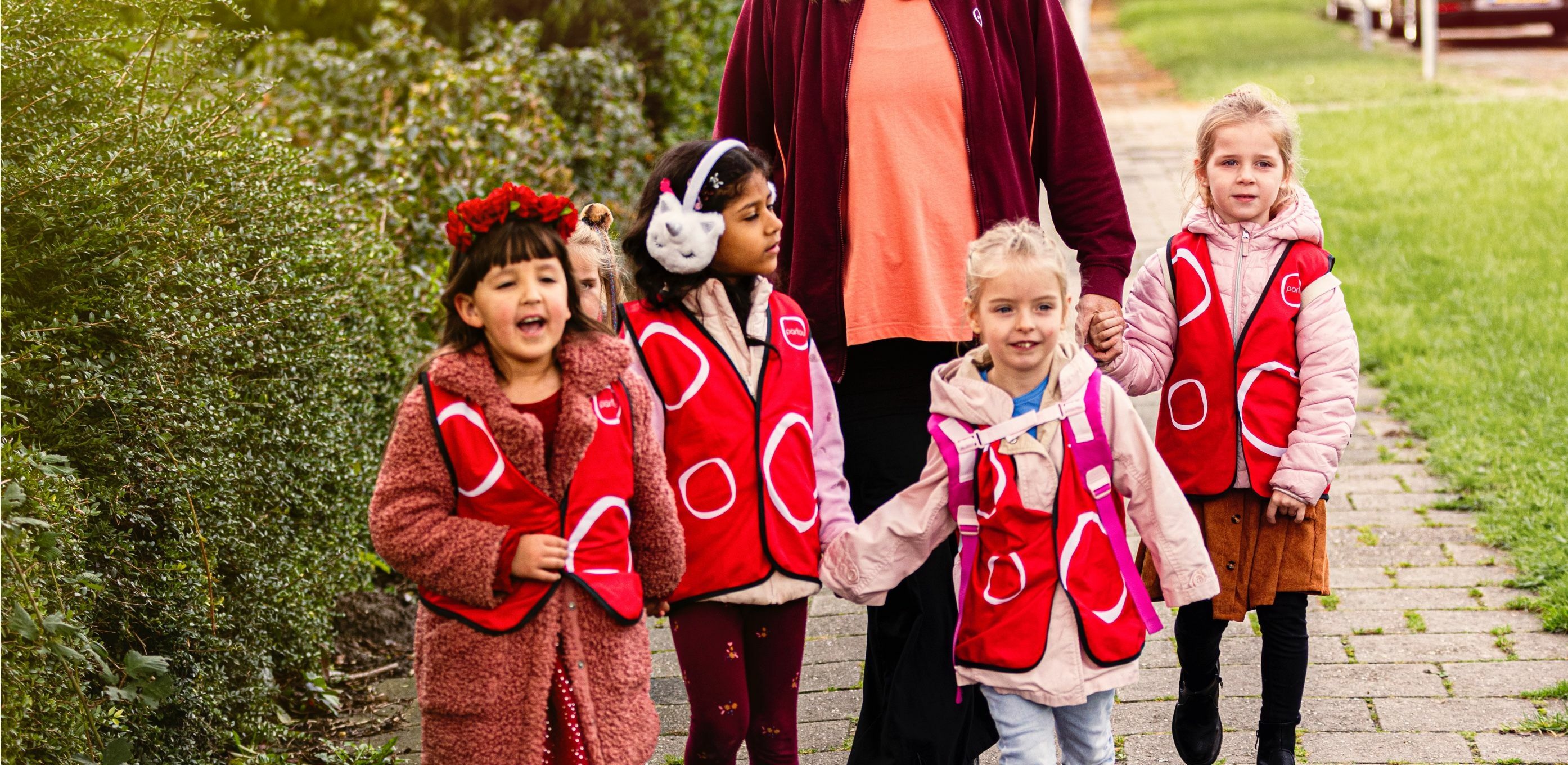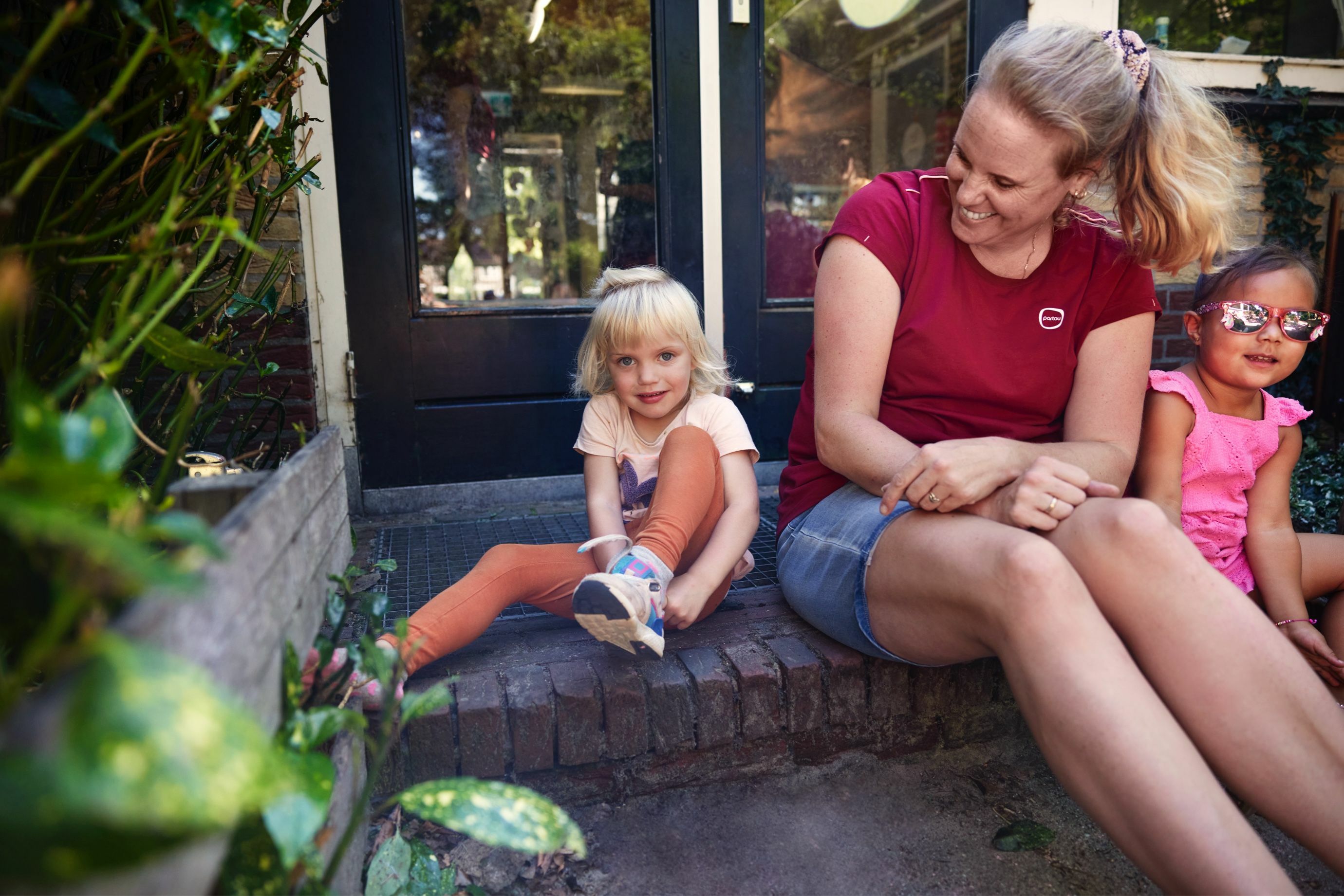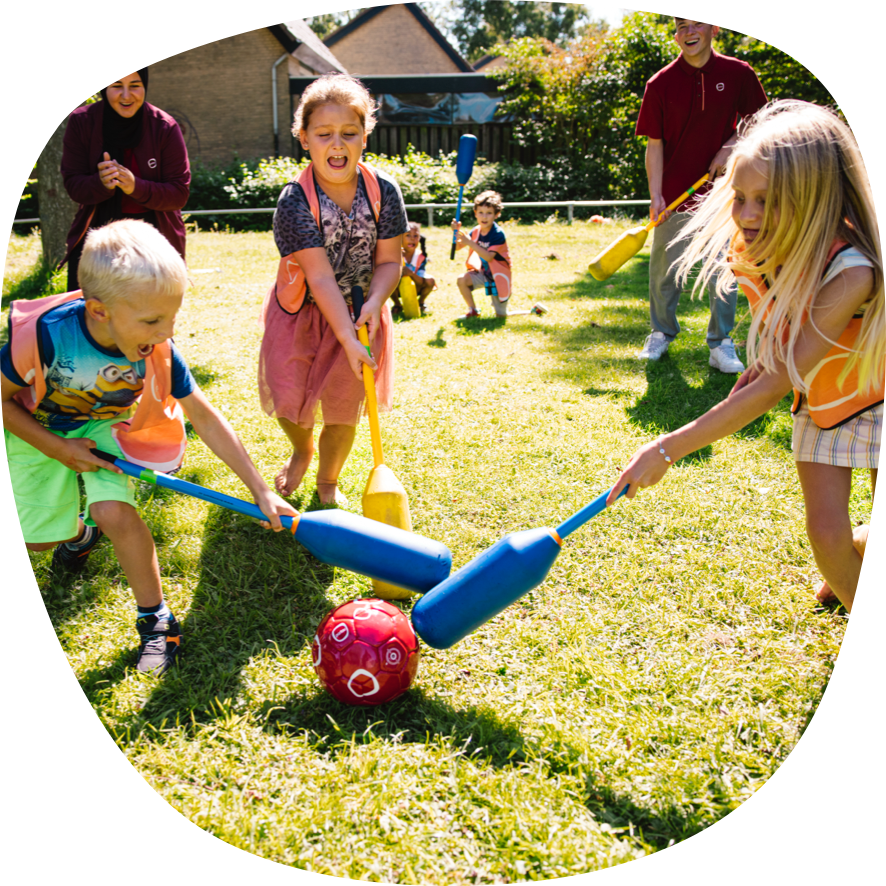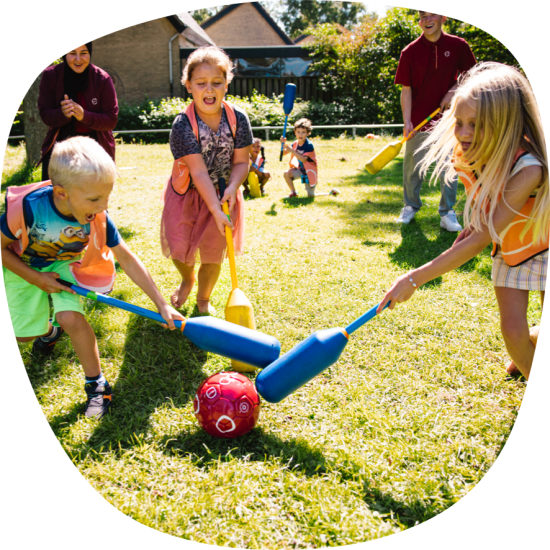

Balance between a familiar location and new places
Our interior space is full of challenges. Among other things, because of the lay out and play materials with various play areas. But what you do inside, you can also do outside. Playing outside is healthy! It puts your brain to work in a different way. So we enjoy the outdoors and learn to respect nature. We go outside every day, in different weather conditions. That makes for endless play possibilities. Seeing how the sun shines through the leaves and creates shadows is a wonderful experience, even for the little ones. Stomping in the puddles or making mud pies is also part of it. And of course discharge and recharge. Is the weather extreme? Then we also enjoy the weather, but safely from behind the window.
In addition to the fun and educational activities that we do both indoors and outdoors at the location, we also undertake activities outside the premises at most of our locations. A stroll in the immediate vicinity, for example, or a visit to a nearby museum with the children from the out-of-school. We have clear agreements with each other about activities of the premises. You can read about it in our off-site activities policy. Location-specific appointments can be found in the location guide.
Balance between inside and outside
Our building blocks
In order to gain new knowledge, skills and experiences, children need a clear head. They need to feel comfortable. Sufficient rest, a healthy diet, alternating between focus time and exercise or daydreaming help to achieve this. So we ensure a healthy balance in the day. We look at the group, but also at individual children.
Our six building blocks play an important role in achieving a healthy balance. That is why we incorporate them in our daily and weekly program in a playful way. Not only do we enrich all moments of the day by incorporating the building blocks, we also use them in the layout of the spaces and play materials. Our six building blocks are represented on our annual activity calendar and our online activity program DoenKids is organized accordingly. This way we always have a balanced offer.
A healthy balance
Learning and enjoying the moment is more important than the end result. Setting the table is not about a perfectly set table, but about cooperation and gross motor skills. Think of carrying a stack of plates or keeping balance with a tray. Zipping up each other's coats and tying shoelaces does not only stimulate fine motor skills, but is also good for social skills. Going to the toilet with your peers helps with potty training. And changing is a perfect moment for one-on-one contact with a baby. In the chapter Interacting with children we will tell you more about how we use every moment.
Every moment of the day has its own character and offers opportunities for contact, fun and development. This also applies to everyday things. Sometimes something beautiful happens in between the regular components of our programme, for example when you sit at the table or go outside. Or when preparing for the afternoon nap at the day care, preparing an activity together or cleaning up at the out-of-school care. We call these moments ‘moments of transition’. Rituals and games help to give transitional moments an additional layer. We sing a familiar song or make a game out of it. This gives children something to hold on to and increases their vocabulary. It makes it extra fun and educational.
Every moment is worth its weight in gold
Our programme includes a number of fixed components, such as (free) play and organized activities, going outside, resting, eating and drinking together at the table or doing an activity. Our programme adapts to the children’s development and needs. Sometimes this has to do with their age. For example, babies drink, sleep and are changed at a rhythm that is predictable and familiar to them, just like at home.
Infants and toddlers are increasingly going along with a group rhythm. The older the children are, the more they are involved in the programme. At out-of-school care, for example, children have a say in what the (activity) programme consists of. Of course, the children's perception of the world, attention span and areas of interest also play a role. Some children need more time than others. Therefore we do not only take age, but also at the individual into consideration.
A daily programme that adapts to your child’s needs
Balance in who you play with
Playing alone with their best friend, in a smaller group with similar interests, or with the whole group. Varying who children play with offers opportunities to form real friendships. And to establish relationships with children who are not necessarily your friend. Together we create a pleasant group dynamic in which we can learn a lot from each other.
Risky play
Of course, we protect the children from danger. We also believe it is important that children learn to deal with risks from an early age and that they are not always dependent on adults in doing so. By introducing them to risks in a safe way, children learn to accept challenges and push their boundaries. We call this risky play. It sometimes results in a bruise, but risky play also has many advantages.
Children become more motor-skilled, confident and social, learn to overcome their fears and develop perseverance. Through risky play, we teach children to deal with smaller risks. We always do this in an age-appropriate way. For example, we let babies and infants climb and scramble on an elevation of soft blocks. We let toddlers balance on a tree stump or a narrow edge. Or we let them spread a slice of bread themselves. At the out-of-school care, your child may play outside the location’s sight or grounds (always in consultation with you). We avoid situations that pose a great risk and therefore become dangerous. We make this consideration carefully. Agreements on this are laid down in our health and safety policy.
Balance between safe and challenging
Unwinding at the out-of-school care
The brain needs sufficient stimuli. But it also needs time to process those stimuli. After focus, relaxation is needed to recharge the battery. If you eat healthy, exercise enough and rest, thinking and concentrating will be a lot better afterwards. That is why we ensure a good balance between busy (and agile) play and calm (concentrated) play. For example, the youngest children take a nap (or two) every day. With older toddlers, we consciously take a moment to play quietly or read a book. We give out-of-school care children room to withdraw for a while and relax. In our activities there is always a choice between active and calm play.
For children in out-of-school care, the transition from school can be quite tough. They have had to concentrate for a long time which can be tiring. Every child needs something different to recharge. Some want to hang around on the couch, alone or with a group of friends. Others want to eat and drink quietly and tell about their experiences that day at the table or want to let off steam and get some exercise. Sometimes a hug is enough. We give your child room, see what your child needs and respond accordingly. This way the afternoon starts relaxed for everyone.
Balance between activities and rest
Balance between choosing yourself and encouraging
Children can always choose whether they want to play freely or participate in an activity. We encourage children to participate. We like to let them experience that new things can be fun, in a safe environment. But we never force them. Sometimes we have an activity on the program that cannot take place due to circumstances, or has to be offered in a different form. We then look for a solution together with the children. During the activity, children can also come up with new play initiatives. We then move with them, in order for them to experience that their opinion matters.
At day care and toddler care
At day care and toddler care, we incorporate an enriching indoor or outdoor activity every day, in addition to free play. The younger the children, the more accessible the activities are.
At locations with pre-school education, this is sometimes slightly different, because we work with a special pre-school program. You can read more about pre-school education when you click here. Furthermore, the pre-school location’s location guide describes in detail what the daily rhythm looks like.
Children learn through play and develop all kinds of skills. It is therefore very important to have room to explore on your own and with others. Moreover, play is the basis for the development of self-confidence. This works best if children are allowed to shape their play independently. We call that free play.
We also organize enriching activities: organized activities that are not only fun, but also contribute to the development of children. Sometimes we work with themes, like the weather seasons or the holidays. Our online activity platform DoenKids helps with this by inspiring our pedagogical staff by offering over three thousand example activities for babies, infants, toddlers and children of primary school age. The activities have been carefully selected and are therefore completely Partou-Proof.
Balance between free play
and organized activities
At the out-of-school care
In addition to free play, children at the out-of-school care can opt for an organized activity every day. This activity can take place indoors or outdoors. Both during the school weeks and during the holiday periods, we combine activities into fun programs. Furthermore, there is an extensive external workshop offer that we can use. Holidays at Partou really add something to children's free time. That's why we provide a fun theme every holiday, in which all six pillars are covered. With a surprising story and lots of special and - above all - fun activities. Please click to read more about holidays at out-of-school-care.

How do we do it?
Every moment is worth its weight in gold for the development of children. In our groups, the daily rhythm is recognizable and predictable. There is a lot of room for play and valuable moments that are not only fun, but also educational. A good balance is very important. Of course, there is always enough room to move along if the day does go a little bit different than expected. In the location guide you will find the global day programme at your location. You can read more about the underlying principle below.
Programme en activities
Balance between choosing yourself and encouraging
Children can always choose whether they want to play freely or participate in an activity. We encourage children to participate. We like to let them experience that new things can be fun, in a safe environment. But we never force them. Sometimes we have an activity on the program that cannot take place due to circumstances, or has to be offered in a different form. We then look for a solution together with the children. During the activity, children can also come up with new play initiatives. We then move with them, in order for them to experience that their opinion matters.
At day care and toddler care
At day care and toddler care, we incorporate an enriching indoor or outdoor activity every day, in addition to free play. The younger the children, the more accessible the activities are.
At locations with pre-school education, this is sometimes slightly different, because we work with a special pre-school program. You can read more about pre-school education when you click here. Furthermore, the pre-school location’s location guide describes in detail what the daily rhythm looks like.
Children learn through play and develop all kinds of skills. It is therefore very important to have room to explore on your own and with others. Moreover, play is the basis for the development of self-confidence. This works best if children are allowed to shape their play independently. We call that free play.
We also organize enriching activities: organized activities that are not only fun, but also contribute to the development of children. Sometimes we work with themes, like the weather seasons or the holidays. Our online activity platform DoenKids helps with this by inspiring our pedagogical staff by offering over three thousand example activities for babies, infants, toddlers and children of primary school age. The activities have been carefully selected and are therefore completely Partou-Proof.
Balance between free play
and organized activities
At the out-of-school care
In addition to free play, children at the out-of-school care can opt for an organized activity every day. This activity can take place indoors or outdoors. Both during the school weeks and during the holiday periods, we combine activities into fun programs. Furthermore, there is an extensive external workshop offer that we can use. Holidays at Partou really add something to children's free time. That's why we provide a fun theme every holiday, in which all six pillars are covered. With a surprising story and lots of special and - above all - fun activities. Please click to read more about holidays at out-of-school-care.

Balance in who you play with
Playing alone with their best friend, in a smaller group with similar interests, or with the whole group. Varying who children play with offers opportunities to form real friendships. And to establish relationships with children who are not necessarily your friend. Together we create a pleasant group dynamic in which we can learn a lot from each other.
Risky play
Of course, we protect the children from danger. We also believe it is important that children learn to deal with risks from an early age and that they are not always dependent on adults in doing so. By introducing them to risks in a safe way, children learn to accept challenges and push their boundaries. We call this risky play. It sometimes results in a bruise, but risky play also has many advantages.
Children become more motor-skilled, confident and social, learn to overcome their fears and develop perseverance. Through risky play, we teach children to deal with smaller risks. We always do this in an age-appropriate way. For example, we let babies and infants climb and scramble on an elevation of soft blocks. We let toddlers balance on a tree stump or a narrow edge. Or we let them spread a slice of bread themselves. At the out-of-school care, your child may play outside the location’s sight or grounds (always in consultation with you). We avoid situations that pose a great risk and therefore become dangerous. We make this consideration carefully. Agreements on this are laid down in our health and safety policy.
Balance between safe and challenging
Balance between a familiar location and new places
Our interior space is full of challenges. Among other things, because of the lay out and play materials with various play areas. But what you do inside, you can also do outside. Playing outside is healthy! It puts your brain to work in a different way. So we enjoy the outdoors and learn to respect nature. We go outside every day, in different weather conditions. That makes for endless play possibilities. Seeing how the sun shines through the leaves and creates shadows is a wonderful experience, even for the little ones. Stomping in the puddles or making mud pies is also part of it. And of course discharge and recharge. Is the weather extreme? Then we also enjoy the weather, but safely from behind the window.
In addition to the fun and educational activities that we do both indoors and outdoors at the location, we also undertake activities outside the premises at most of our locations. A stroll in the immediate vicinity, for example, or a visit to a nearby museum with the children from the out-of-school. We have clear agreements with each other about activities of the premises. You can read about it in our off-site activities policy. Location-specific appointments can be found in the location guide.
Balance between inside and outside
Our building blocks
In order to gain new knowledge, skills and experiences, children need a clear head. They need to feel comfortable. Sufficient rest, a healthy diet, alternating between focus time and exercise or daydreaming help to achieve this. So we ensure a healthy balance in the day. We look at the group, but also at individual children.
Our six building blocks play an important role in achieving a healthy balance. That is why we incorporate them in our daily and weekly program in a playful way. Not only do we enrich all moments of the day by incorporating the building blocks, we also use them in the layout of the spaces and play materials. Our six building blocks are represented on our annual activity calendar and our online activity program DoenKids is organized accordingly. This way we always have a balanced offer.
A healthy balance

Every moment of the day has its own character and offers opportunities for contact, fun and development. This also applies to everyday things. Sometimes something beautiful happens in between the regular components of our programme, for example when you sit at the table or go outside. Or when preparing for the afternoon nap at the day care, preparing an activity together or cleaning up at the out-of-school care. We call these moments ‘moments of transition’. Rituals and games help to give transitional moments an additional layer. We sing a familiar song or make a game out of it. This gives children something to hold on to and increases their vocabulary. It makes it extra fun and educational.
Every moment is worth its weight in gold
Learning and enjoying the moment is more important than the end result. Setting the table is not about a perfectly set table, but about cooperation and gross motor skills. Think of carrying a stack of plates or keeping balance with a tray. Zipping up each other's coats and tying shoelaces does not only stimulate fine motor skills, but is also good for social skills. Going to the toilet with your peers helps with potty training. And changing is a perfect moment for one-on-one contact with a baby. In the chapter Interacting with children we will tell you more about how we use every moment.
Our programme includes a number of fixed components, such as (free) play and organized activities, going outside, resting, eating and drinking together at the table or doing an activity. Our programme adapts to the children’s development and needs. Sometimes this has to do with their age. For example, babies drink, sleep and are changed at a rhythm that is predictable and familiar to them, just like at home.
Infants and toddlers are increasingly going along with a group rhythm. The older the children are, the more they are involved in the programme. At out-of-school care, for example, children have a say in what the (activity) programme consists of. Of course, the children's perception of the world, attention span and areas of interest also play a role. Some children need more time than others. Therefore we do not only take age, but also at the individual into consideration.
A daily programme that adapts to your child’s needs

Every moment is worth its weight in gold for the development of children. In our groups, the daily rhythm is recognizable and predictable. There is a lot of room for play and valuable moments that are not only fun, but also educational. A good balance is very important. Of course, there is always enough room to move along if the day does go a little bit different than expected. In the location guide you will find the global day programme at your location. You can read more about the underlying principle below.
Programme en activities
Unwinding at the out-of-school care
The brain needs sufficient stimuli. But it also needs time to process those stimuli. After focus, relaxation is needed to recharge the battery. If you eat healthy, exercise enough and rest, thinking and concentrating will be a lot better afterwards. That is why we ensure a good balance between busy (and agile) play and calm (concentrated) play. For example, the youngest children take a nap (or two) every day. With older toddlers, we consciously take a moment to play quietly or read a book. We give out-of-school care children room to withdraw for a while and relax. In our activities there is always a choice between active and calm play.
For children in out-of-school care, the transition from school can be quite tough. They have had to concentrate for a long time which can be tiring. Every child needs something different to recharge. Some want to hang around on the couch, alone or with a group of friends. Others want to eat and drink quietly and tell about their experiences that day at the table or want to let off steam and get some exercise. Sometimes a hug is enough. We give your child room, see what your child needs and respond accordingly. This way the afternoon starts relaxed for everyone.
Balance between activities and rest